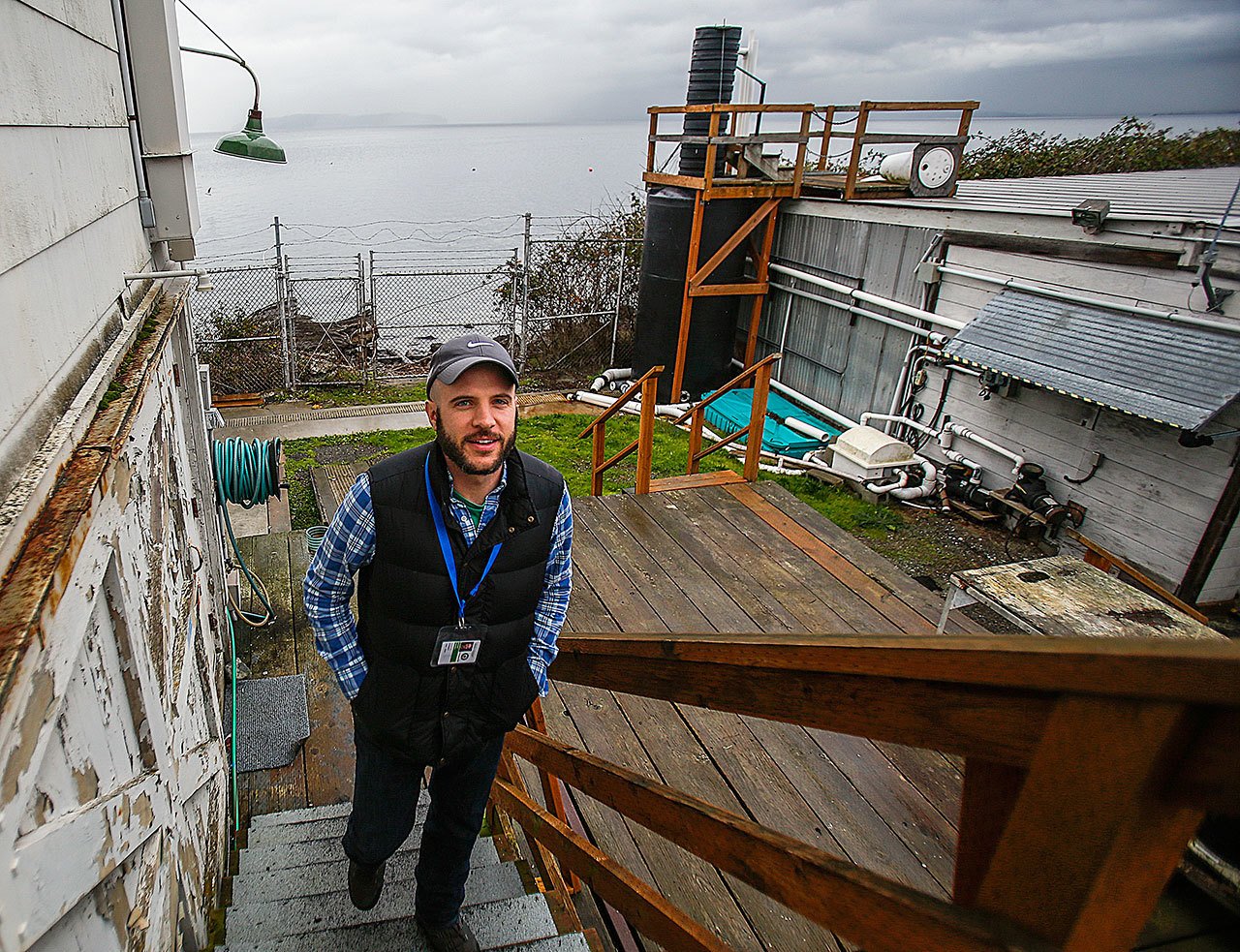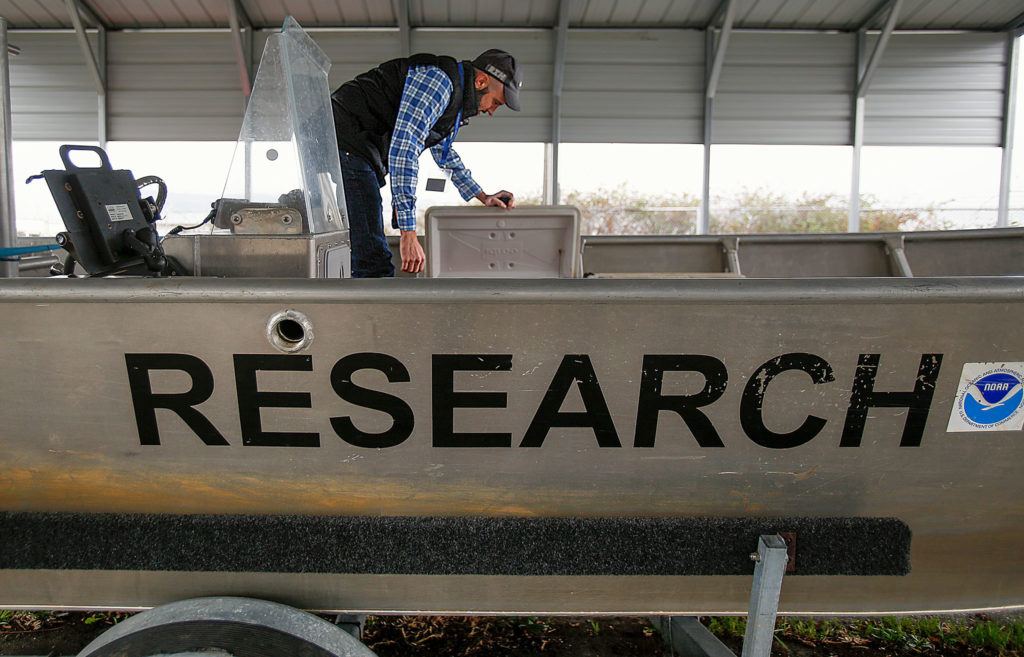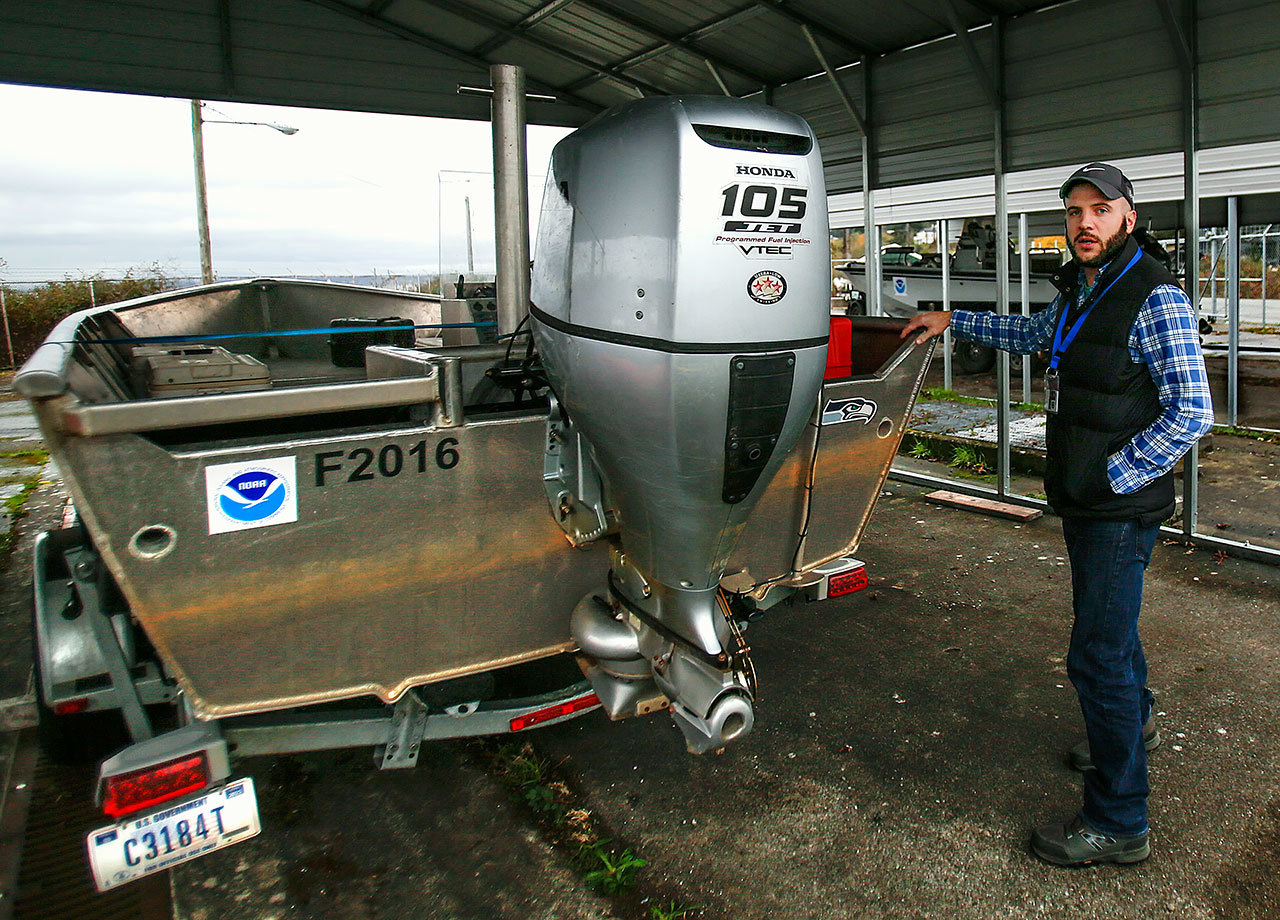On a misty morning in Mukilteo, Barney Boyer was going over the R/V Seahawk. Climbing into the NOAA research vessel, which was out of the water last week, he was a long way from a military runway in Qatar.
Boyer served in the U.S. Air Force in the early years of the Iraq war. Based at Al Udeid Air Base near Doha, Qatar, his job in 2003 and 2004 was maintaining runways for military planes.
“We provided support for Marines going in and out of Iraq,” said Boyer, 35, who signed up at an Air Force recruitment office the day after the 9/11 terrorist attacks.
Today, his workplace is the Mukilteo Research Station of NOAA’s Northwest Fisheries Science Center. Boyer is the first military veteran to become an intern with NOAA Fisheries through a new partnership.
Working together to offer the internship are the state’s Department of Veterans Affairs and Veterans Conservation Corps, NOAA (National Oceanic and Atmospheric Administration) Fisheries’ West Coast Region, the NOAA Restoration Center and the Northwest Fisheries Science Center.
“He’s the first one in the state,” said John Floberg, a marine habitat resource specialist at the NOAA Restoration Center at Sand Point in Seattle.
It may also be a national first. Although NOAA in California has veterans on field crews doing habitat restoration, Floberg believes Boyer’s opportunity is the first individual internship of its kind for a veteran. Through one-on-one learning experiences, “we help them meet academic, career and personal goals,” Floberg said.
Boyer, a native of Oak Park, Illinois, near Chicago, has a big goal related to the work he’s been doing since starting the six-month internship in September. With a bachelor’s degree from the University of Illinois, where he studied sustainability science, he hopes to go to graduate school in fisheries at the University of Washington.
He has helped Anna Kagley, a fishery biologist at the Mukilteo Research Station, with Elwha River near-shore monitoring since the dam removal there.
“I’m learning so much. I’m not doing the actual research, but I’m out there on the boat,” said Boyer, who has helped Kagley and other NOAA staff with their studies.
Kagley has worked since 2004, before Elwha River restoration began on the Olympic Peninsula, monitoring forage fish — those eaten by larger fish. She has done research at sites near where the Elwha empties into the Strait of Juan de Fuca. Since the 2012 dam removal, she has measured big increases in forage fish.
Boyer has also helped with research related to invasive freshwater fish in the Snohomish River estuary. “They’re probably from lakes and ponds up further in the watershed, introduced for sport fishing,” he said. Bass, yellow perch and sunfish find their way to places in the river “otherwise occupied by native fish,” Boyer said. “That’s a problem.”
Kagley said she has had great mentors since starting with NOAA as a student in 1987. “I want to pay that forward,” she said. “This is a program to expose veterans to possible career paths,” said Kagley, describing Boyer as bright and hard-working.
“When we’re working on small boats in the field, he’s great at taking instructions and great at applying the big picture. He asks why,” she said. “He works twice as hard as the rest of us.”
One goal during his internship is for Boyer to help researchers publish a peer-reviewed paper, which may advance his aim of studying at UW.
His interest in salmon dates to his younger years in the Midwest. In the late 1960s, coho and Chinook salmon were transplanted from the Northwest to the Great Lakes, which had problems with invasive fish called alewives. “Chinook and coho salmon, I’ve been around those fish since I was a kid,” Boyer said. “I moved out here and got involved in where the fish are actually native.”
Boyer, who has a 4-year-old daughter, now lives with his sister in Snohomish. It’s been a long road to find his dream career. After the Air Force, he worked in restaurants and hotel management. In the culinary field, he became interested in food sources. “I’ve always been pretty environmentally conscious,” he said.
Floberg said the example of John Beal, an environmentalist and Vietnam veteran, provided inspiration for the NOAA internship. Beal, who died in 2006, suffered from post-traumatic stress and other health problems after serving in Vietnam, Floberg said. Beal began cleaning up garbage along the Duwamish River, and his life improved as he embraced that stewardship.
Boyer said the military was good for him. “Everyone reacts differently to their military experience. I’ve had a very good experience being a veteran,” he said. Now, he is grateful for a new opportunity.
“I wanted to do something bigger and better — to be part of something,” Boyer said.
Julie Muhlstein: 425-339-3460; jmuhlstein@heraldnet.com.
Learn more
Military veterans interested in a NOAA Fisheries internship may learn more by contacting John Floberg, a marine habitat resource specialist at the NOAA Restoration Center in Seattle. Email: John.R.Floberg@noaa.gov
Talk to us
> Give us your news tips.
> Send us a letter to the editor.
> More Herald contact information.




























